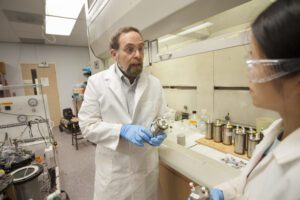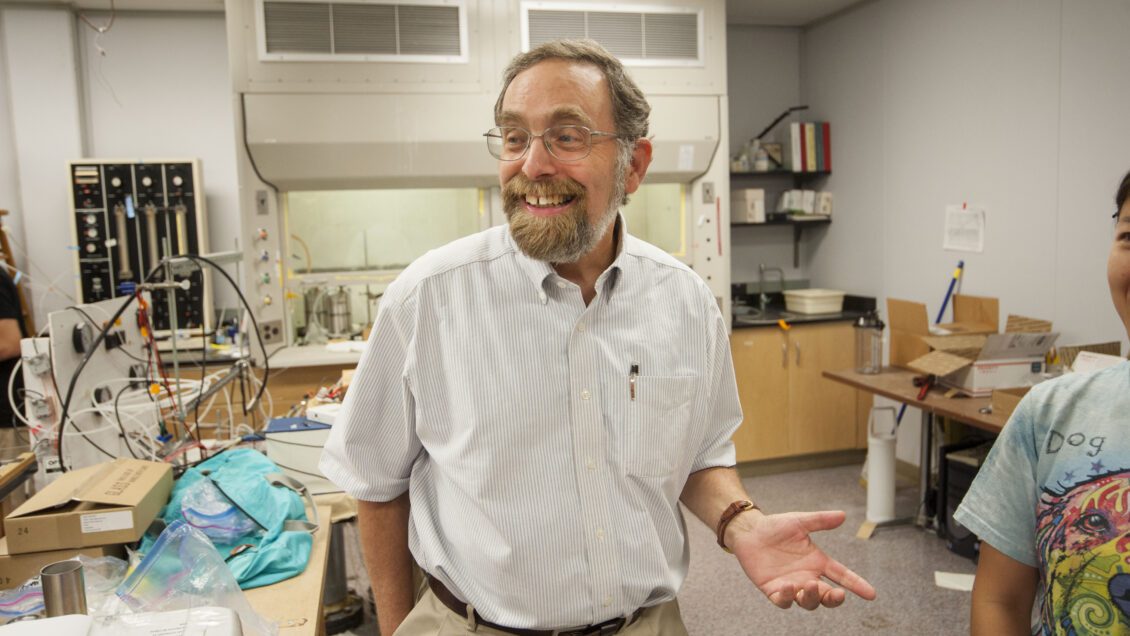David Freedman of Clemson University ended the spring semester with an award that underscores his more than 50 years of dedication to environmental sustainability.

Freedman, chair of the Department of Environmental Engineering and Earth Sciences at Clemson, won the Earth Caretaker Award from his undergraduate alma mater, the University of Wisconsin-Green Bay (UWGB).
“I was surprised and delighted with the award,” Freedman said. “I happen to know a number of people who have won the award in the past, and I have great admiration for them.”
Freedman traced his interest in environmental sustainability to the first Earth Day in 1970, a time when pollution was impossible to miss and concern for the environment was less partisan than it is now. The Cuyahoga River catching fire in Cleveland and the thick smog shrouding Los Angeles, for example, became rallying cries for a generation.
Now, as department chair and professor, Freedman is helping shape the next generation of environmental engineers and Earth scientists and guiding innovative research that is helping keep the planet and its denizens healthy.
In his career, Freedman has mentored 67 master’s students, 12 Ph.D. students and five postdoctoral researchers. He has taught 14 environmental engineering courses from the undergraduate level to graduate school.
As a researcher, he played a key role in Clemson’s response to COVID-19. Freedman was among the first in the country to monitor wastewater to predict the disease’s prevalence in the community. The Clemson City Council unanimously passed a face-covering ordinance in June 2020 after Freedman found surprisingly high levels of the virus at one of the area’s wastewater treatment plants.
Read the interview below to learn more about what Freedman has done to advance sustainability, which environmental threat concerns him most and his greatest source of hope for the future. Click here to learn more about the award and his undergraduate work on a dairy farm’s anaerobic digester, one of the first in Wisconsin.
You’ve been passionate about environmental sustainability since high school, and you have devoted your career to the topic. Do you feel like you are living the dream?
It certainly sustains me personally, because you’re right, that’s been a passion of mine since high school. One of the keys to being successful both as a teacher and a researcher is to be able to communicate that passion. Students, especially younger people, are very appreciative and get excited by a professor who is passionate about their area, and that is certainly what describes me. I feel extremely fortunate to have found a career where I can share that passion with students. Professors have a multiplier effect through their students, and I’ve had the honor to educate students so that they can go out and do the things that need to be done to make the planet a better place to live.
What do today’s students need to know to be the leaders, innovators, entrepreneurs of the future in environmental engineering and Earth sciences?
We’ve done a really good job with the environmental engineering undergraduate degree, as well as the graduate degree, teaching a breadth of information. The thing about being an environmental engineer is that you’re responsible for providing the citizenry with clean drinking water. I think the vast majority of people have no clue as to how water comes out of the tap safe to drink, cook, bathe and wash your clothes, so we need engineers capable of designing and operating treatment plants that do that. Same goes for wastewater. Wastewater goes down the toilet, shower or washing machine, and it just goes away. It’s only when you travel to a less developed country and see that they lack the infrastructure for water and wastewater treatment that you begin to appreciate what life would be like in the absence of that infrastructure. So, a lot of our graduates are involved in the bread-and-butter issues of water and wastewater treatment, air quality, and management of solid, hazardous, and radioactive wastes.
What concerns you most when you think about environmental sustainability?
We’re almost getting too used to the idea of hearing people talk about climate change as an existential threat that almost at this point doesn’t do the topic justice. Back in the 1970s, we barely understood the idea that introducing all this carbon dioxide into the atmosphere was potentially a time bomb in terms of climate change. In those days, pollution was in your face in the form of dirty surface water, dirty air and solid waste accumulating all over the place. The problem with climate change is so much more difficult for the average person to get their arms around. I think we are in a race right now to decarbonize our economy. Can we do it fast enough to avert the most severe effects? We’re already facing the effects of climate change. Abnormalities that we see in weather and climate in general are definitely tied to the way that we’ve altered the climate, and so we’re in a race to try to avert the worst.
What is your greatest source of optimism?
In the most recent past, the greatest source of optimism I can point to is the passage of the Inflation Reduction Act, which has for the first time in history put a large amount of federal resources behind incentives encouraging the transition to a non-carbon future, as opposed to penalties. And when you look at the technology that’s available to us to accomplish this transition, it’s right there. I just hope it’s not too little too late.
David Freedman bio:
Spouse: Dr. Susan Peirce
Undergraduate degree: Bachelor of Science in science and environmental change
Graduate degrees: Master of Science in Environmental Engineering from the University of Cincinnati; Ph.D. in environmental engineering from Cornell University
Joined Clemson: 1996
Promoted to department chair: 2015
Research and teaching interests: Hazardous waste management, water and wastewater treatment, and biodegradation/bioremediation of recalcitrant organic compounds
Get in touch and we will connect you with the author or another expert.
Or email us at news@clemson.edu

